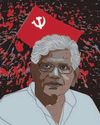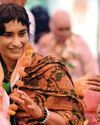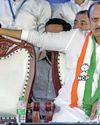
East Delhi resident Gaurav Kumar has entirely shifted to Jan Aushadhi Kendras for medicinal needs. He unequivocally dismisses doubts over the quality of drugs sold at the Centre-run kiosks. "The price difference is also whopping, 50-90 per cent," he says. Anil Vats, a retired government servant from Ghaziabad, says: "My lung disease tablets cost ₹250 per pack. At Jan Aushadhi, I get it for ₹60."
To ensure quality, all batches supplied to over 10,000 Jan Aushadhi stores across 750 districts go through double checks. Ravi Dadhich, CEO, pharmaceuticals and medical devices bureau of India, ministry of chemicals and fertilizers, tells THE WEEK: "After procuring medicines from WHO GMP (Good Manufacturing Practices) certified suppliers, each batch is again tested at our laboratories to ensure quality."
Certainly, these stores are striving to provide affordable generic medicines. This, however, is only a small part of the story. The ecosystem of generic drugs in India is far too wide and cumbersome. Generic or branded medicines have no specific definitions. They, for all purposes, generally "contain the same active ingredient in the same dosage form, intended to be administered by the same administrative route" as the branded drugs.
Dr Preeti Kumar, vice president, public health system support of the Public Health Foundation of India, explains: "There are primarily three types of drugs-generic, brandedgeneric and patented." She adds that the generic and patented together constitute around 20 per cent of the market. "The remaining 80 per cent is covered by branded-generics that constitute around 2,800 formulations and unique molecules for various diseases spanning over 55,000 brands," she says. "If we keep the patented drugs aside (which is only 8-10 per cent), the issue of quality remains with both generic and branded-generics and it is not entirely correct to equate branded-generic with quality."
Denne historien er fra May 05, 2024-utgaven av THE WEEK India.
Start din 7-dagers gratis prøveperiode på Magzter GOLD for å få tilgang til tusenvis av utvalgte premiumhistorier og 9000+ magasiner og aviser.
Allerede abonnent ? Logg på
Denne historien er fra May 05, 2024-utgaven av THE WEEK India.
Start din 7-dagers gratis prøveperiode på Magzter GOLD for å få tilgang til tusenvis av utvalgte premiumhistorier og 9000+ magasiner og aviser.
Allerede abonnent? Logg på

A golden girl
One of India's most formidable beauties passed away earlier this month. The odd thing is she would absolutely hate this obituary; she hated being written about and avoided publicity for all of her nine decades. Indira Aswani was 93 when she died. But anyone who encountered her, even briefly, was in such awe of her grace and poise, and one could not but remember her forever.

The interest in wine is growing delightfully in India
The renowned British wine writer and television presenter Jancis Robinson, 74, recently came to Delhi and Mumbai to reacquaint herself with India's wine industry. This was the Robinson's fourth visit to India; the last one was seven years ago. On this trip, Robinson and her husband, restaurateur Nicholas Lander, were hosted by the Taj Hotels and Sonal Holland, India's only Master of Wine.

United in the states
Indian-Americans coming together under the Democratic umbrella could get Harris over the line in key battlegrounds

COVER DRIVE
Usage-driven motor insurance policies offer several benefits

GDP as the only measure of progress is illogical
Dasho Karma Ura, one of the world's leading happiness experts, has guided Bhutan's unique gross national happiness (GNH) project. He uses empirical data to show that money cannot buy happiness in all circumstances, rather it is family and health that have the strongest positive effect on happiness. Excerpts from an interview:

India is not a controlling big brother
Prime Minister Tshering Tobgay considers India a benevolent elder sibling as the \"big brotherly attitude\" is happily missing from bilateral ties. He thinks the relationship shared by the two countries has become a model of friendship not just for the region, but for the entire world. \"India's attitude is definitely not of a big brother who is controlling and does not allow the little brother to blossom and grow,\" says Tobgay in an exclusive interview with THE WEEK.

Comrade with no foes
Lal Salaam, Comrade Yechury-you were quite a guy!

Pinning down saffron
In her first political bout, Vinesh Phogat rides on the anti-BJP sentiment across Haryana

MAKE IN MANIPUR
Home-made rockets and weapons from across the border are escalating the conflict

SAHEB LOSES STEAM
Coalition dynamics and poor electoral prospects continue to diminish Ajit Pawar's political stock